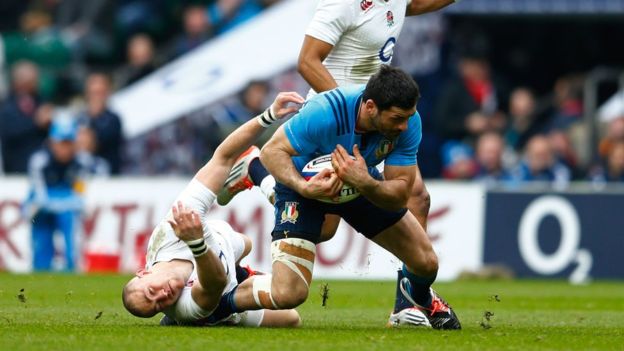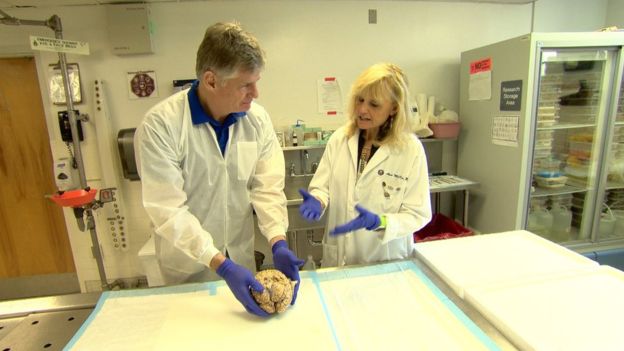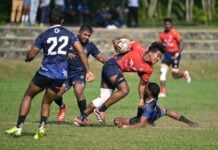World Rugby’s chief medical officer has told the BBC the sport’s rules may have to change to reduce concussions.
England full-back Mike Brown was stretchered off after being knocked unconscious during England’s Six Nations match against Italy earlier this year
As the 2015 Rugby World Cup continues, Martin Raftery said the tackle would be the most likely focus of any changes.
Reported concussions in rugby have doubled in five years and a UK expert said on average one player at every Six Nations match suffered a brain injury.
English and Scottish rugby unions said they were trying to make the game safer and increase awareness of concussion.
The number of reported concussions in English rugby rose by 59% in 2013-14. In Scotland, the number of cases being reported has also nearly doubled in the past two years, after the SRU called for incidents to be flagged up.
The investigation, by BBC Panorama, is presented by John Beattie, a former British Lion and Scotland international.
Concussion facts
Only one in 10 concussions result in a loss of consciousness.
Concussion can cause dizziness, nausea, memory loss and personality change.
Symptoms can persist, causing post-concussion syndrome.
Post-concussion syndrome can cause depression and personality changes and may last days, weeks or months.
Beattie has pledged to donate his brain to scientists studying the potential impact of head knocks.
He spoke to Dr Raftery, World Rugby’s most senior medical figure, about what the sport could do to reduce the number of brain injuries.
The chief medical officer said: “Player welfare is about identifying what the risk is and then bringing about change.
“There’s no doubt that the biggest area that we know where concussion is going to occur is in the tackle, so that will help us to look at the tackle and see what we can do to make it safer.
“My job is to identify risk and then look for solutions and then present those solutions to the law-makers to make the changes that will bring about protection of the athlete.”
Ann McKee’s team have been examining the brains of ex-athletes for signs of CTE
John Beattie: Is rugby bad for my brain?
I’m deep in the bowels of the new super-hospital in the south of Glasgow – the one not entirely reassuringly dubbed the Death Star by the city’s residents – and things have taken a strange turn.
Consultant neuropathologist Willie Stewart is showing me a fridge full of brain samples. So it’s not your average start to the day.
But there’s an added layer of oddness. I know that one day – hopefully not too soon – my brain will be in this freezer too.
It will be used to help research into whether playing contact sports like rugby can result in long-term brain damage.
I can only remember two or three concussions from my career. I was never knocked out. But I’ve always wondered what the sport might have done to my brain.
Raftery is reviewing video evidence from 900 concussions in an attempt to identify why the injuries occur. Any possible changes to the laws would be based on this analysis.
That evidence and any recommendations would be presented to the governing body’s Laws Committee. That body would then take a final decision.
One option that has been suggested for reform of the tackle is changing the rules to encourage players to tackle lower on the body of their opponent.
Dr James Robson, Scottish Rugby Union’s chief medical officer, agreed that rule changes were needed to make the game safer.
He said injury data from the grassroots game had been gathered over the past couple of years and the number of concussions had almost doubled in that time.
“Two seasons ago we had a real push, a real initiative – we educated people that only by knowing what was happening with injury could we make a significant difference,” he said.
“I truly believe that the doubling between that season and the following season of the number was actually down to that education.
“I strongly believe that we do need to look at the laws of the game and the way that it’s played.”
Post-concussion syndrome ended Andy Hazell’s 17-year pro rugby career
“I think it’s not so much the one-off contact but the repeat concussion, the repeat hit that maybe is not helping – where it’s not head on head but it’s just heavyweight collisions, just bang, bang, bang,” Andy Hazell told the BBC.
“I was seeing stars, things like that, I’d probably say 20 times.
“I’d feel light-headed and I’d be training and I’d actually feel in a dream. I’d be standing at the back of the line-out thinking this is like I’m actually dreaming.
“I was scared about what could happen. When it’s my knee and things like that I always sort of just try and push through it. But this time I was cautious – this is your brain and you can’t mess about.
“In one of the sessions we did there was a loose ball and I hesitated, and then I knew inside me that that was it really. I never wanted to be that player who hesitates or tries to shirk something.
“[After retirement] Every day I was getting worse and worse.
“I was more snappy around the family, I could feel myself becoming that person. That sort of accumulated then with the depression.
“I took a bit of time where I did nothing. Touch wood now I feel good and the only thing now I have to think about now is what will happen in the future.”
Bill Beaumont, chairman of the English governing body, the Rugby Football Union, said: “I think there was a stage when the game did go pro, when the emphasis was on size, on bulking up and bigger hits.
“But now, I think, over the last 12-18 months, I think there’s more of an emphasis on more speed around the game. I do think the players are looking to do more running than more gym work.”
The documentary team heard from Boston-based brain scientist Prof Ann McKee, who believes that repeated head knocks may be linked to a type of dementia called Chronic Traumatic Encephalopathy.
CTE symptoms include memory loss, depression, speech problems, mood changes and difficulty walking.
Prof McKee’s research found CTE in the brains of former athletes who played contact sports such as American football and rugby.
She said: “There is an absolute link between head trauma, multiple minor head traumas and a neurodegeneration, and the one we’re seeing most commonly is something called CTE.
“The lesson to world sport is I think we should stop arguing about whether or not playing sports with a lot of hits to the head is a risk for this disorder. It is.
“There’s a lot of resistance to that notion but it absolutely is a risk and so we need to play smarter. We need to keep our heads out of the game as much as we can. We need to develop techniques that are isolating our head from the injuries and then we need to recognise an injury when it happens.”
Work at the brain bank in Massachusetts has found CTE in more than 100 NFL players, and Prof McKee said risks were increased the longer an athlete’s career lasted.
“I would not want a son of mine playing rugby,” she said.
“I think there’s good evidence that it’s a high risk sport and I’d want to avoid that, but I do think you know we just need to allow everyone to make their own informed decision.”
Concussion experts in the UK are worried about the elite game and how potential players will view the sport.
Neuropathologist Dr Willie Stewart, who works at Glasgow’s Southern General Hospital, thinks change in the sport is overdue.
He said: “Are we going to accept every time there’s a Six Nations match, at least one rugby player is going to go off with concussion?
“Is that an acceptable level of injury? Of course it’s not, one out of 30 players in a park who’s going off brain injury is totally unacceptable.
“I’m already hearing people saying ‘you know I wouldn’t let my kids play rugby.’
“I try and argue against that wherever I can because I think rugby’s fantastic.
“I think if it doesn’t do something really pro-active about it soon, parents and spectators are going to say that’s not the game that I want to watch anymore because there’s too much damage being done to young men, and they’ll turn away from it.
“So now we have to think of how we can reduce that risk.”


















